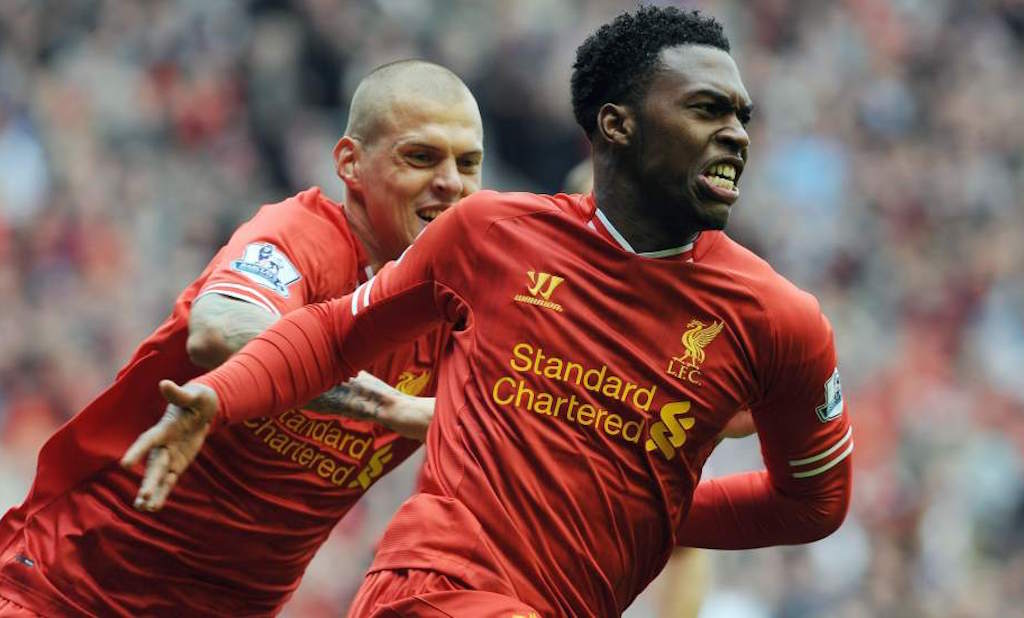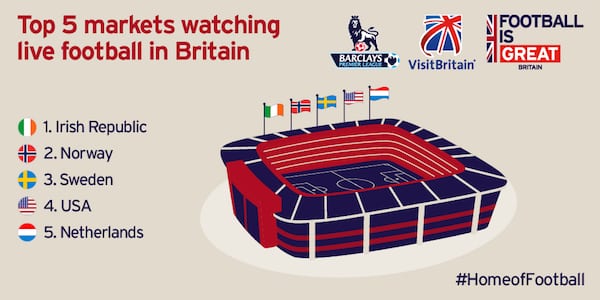Skift Take
With NBCSports' investment in broadcast rights for the Premier League, and Fox Sports' rights investment for the German Bundesliga, the growth of football fandom in the U.S. will only grow and create additional opportunities for tourism.
A new report released by VisitBritain shows that more than one out of ten international visitors watched a live European football (soccer) match while visiting Northwest England.
The “Football Tourism Scores for Britain” report is based on the country’s 2014 International Passenger Survey, which included a question asking if visitors attended a game.
The results show that slightly more than 800,000 inbound visitors across all of Britain saw a European Premier League football match, with the highest percentage (10.6%) among those who visited Manchester and Liverpool in Northwest England.
The next most popular region was Northeast England, where about 5.6% of international visitors attended a game.
Surprisingly, U.S. visitors represent the fourth largest inbound travel market to watch European football, behind passenger arrivals from Ireland, Norway and Sweden.
This presents a solid growth opportunity for both Visit Manchester and Visit Liverpool to drive increased American visitation. Both destination marketing organizations haven’t promoted their most popular sport to U.S. travelers as much as they could.
U.S. interest in soccer is growing. The Austin-based Umbel Corporation, which is “passionate about making data beautiful,” posted 10 Data Points That Prove That Soccer Has Finally Made It In America in July. Among them, it says more Americans watched the Women’s World Cup final than the NBA basketball or Stanley Cup hockey championships.
In addition, “According to Adobe Digital Index data analysis, U.S. social media buzz for events like Europe’s annual UEFA Champions League is doubling year-over-year.”
Manchester and Liverpool are especially reaping the benefits of football tourism in terms of higher average spend and length-of-stay among the business sector. The VisitBritain report states, “Business visitors who go to a football match have a length of stay more than twice that of their non-football-watching business visitor compatriots.”
In 2014, over 40,000 international business travelers attended a football game in England, Scotland and Wales.
Moreover, the highest international visitor attendance at football games in 2014 took place during January to March (31%) and October to December (21%). That illustrates the ability of teams like Manchester United and Liverpool FC to drive tourism in the shoulder seasons on both sides of peak summer arrivals.
Need For More Football Content
Considering the major infrastructure redevelopment of Manchester and Liverpool over the last two decades, the two cities stand on their own as regional tourism capitals. Football could create more excitement and exposure around each destination, and delineate their value propositions among U.S. consumers, because the sport is an iconic travel experience and unique brand identifier in the region.
However, the Manchester and Liverpool tourism websites are seemingly more inclined to promote football history tours in the stadiums than the live football games themselves. For the meetings industry, the Manchester and Liverpool convention bureau websites also don’t highlight football to any significant degree.
The most significant football tourism promotion is the Barclays Premier League section at VisitBritain’s Love Wall microsite. The content hub includes a profile of the 20 British Premier League teams, hotel options in each of their cities, logistical info, and links to purchase tickets.
There’s room here for more indepth and interesting storytelling, especially video content, for Americans who don’t know a lot about the Premier League beyond a handful of star players.
Have a confidential tip for Skift? Get in touch
Tags: britain, england, sports tourism
Photo credit: Liverpool Football Club plays in Anfield Stadium just minutes from the city center.


